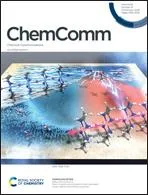Boronic acid liposomes for cellular delivery and content release driven by carbohydrate binding‡
Literature Information
Xiaoyu Zhang, Daiane S. Alves, Jinchao Lou, Shelby D. Hill, Francisco N. Barrera, Michael D. Best
Boronic acid liposomes enable triggered content release and cell delivery driven by carbohydrate binding. Dye release assays using hydrophilic and hydrophobic fluorophores validate dose-dependent release upon carbohydrate treatment. Microscopy results indicate dramatic enhancements in cell delivery, showcasing the prospects of boronic acid lipids for drug delivery.
Recommended Journals
Related Literature
IF 6.222
An elemental S/P photocatalyst for hydrogen evolution from water under visible to near-infrared light irradiationIF 6.222
Catalytic depolymerization of Kraft lignin to produce liquid fuels via Ni–Sn metal oxide catalystsIF 6.367
Efficient one-pot synthesis of alkyl levulinate from xylose with an integrated dehydration/transfer-hydrogenation/alcoholysis processIF 6.367
Chemoproteomics-based target profiling of sinomenine reveals multiple protein regulators of inflammationIF 6.222
Metal–organic frameworks: preparation and applications in highly efficient heterogeneous photocatalysisIF 6.367
Biomaterials Science Emerging Investigators 2021IF 6.843
Retraction: Chemical synthesis and antigenic activity of a phosphatidylinositol mannoside epitope from Mycobacterium tuberculosisIF 6.222
Developing a novel high performance NaNbO3-based lead-free dielectric capacitor for energy storage applicationsIF 6.367
Redox responsive Pluronic micelle mediated delivery of functional siRNA: a modular nano-assembly for targeted deliveryIF 6.843
Source Journal
Chemical Communications

ChemComm publishes urgent research which is of outstanding significance and interest to experts in the field, while also appealing to the journal’s broad chemistry readership. Our communication format is ideally suited to short, urgent studies that are of such importance that they require accelerated publication. Our scope covers all topics in chemistry, and research at the interface of chemistry and other disciplines (such as materials science, nanoscience, physics, engineering and biology) where there is a significant novelty in the chemistry aspects. Major topic areas covered include: Analytical Chemistry Catalysis Chemical Biology and medicinal chemistry Computational Chemistry and Machine Learning Energy and sustainable chemistry Environmental Chemistry Green Chemistry Inorganic Chemistry Materials Chemistry Nanoscience Organic Chemistry Physical Chemistry Polymer Chemistry Supramolecular Chemistry
Recommended Compounds
Recommended Suppliers
 EspyChem (Shanghai) Co., Ltd.
EspyChem (Shanghai) Co., Ltd. Shenzhen FangcunDa Technology Co., Ltd.
Shenzhen FangcunDa Technology Co., Ltd. CARBOGEN AMCIS AG
CARBOGEN AMCIS AG Nanjing Odyssey Chemical Co., Ltd.
Nanjing Odyssey Chemical Co., Ltd. Arch Química, S.A. de C.V.
Arch Química, S.A. de C.V. Guangzhou Gendá Trading Co., Ltd.
Guangzhou Gendá Trading Co., Ltd. Dr. Reinschmidt Gefahrgutberatung
Dr. Reinschmidt Gefahrgutberatung KUKA Systems GmbH
KUKA Systems GmbH Huzhou Hehua Machinery Co., Ltd.
Huzhou Hehua Machinery Co., Ltd. Hefei Novartis Biotechnology Co., Ltd.
Hefei Novartis Biotechnology Co., Ltd.










![315234-49-2 - 1-[(Tert-butoxy)carbonyl]-2-(prop-2-en-1-yl)pyrrolidine-2-carboxylic acid 315234-49-2 - 1-[(Tert-butoxy)carbonyl]-2-(prop-2-en-1-yl)pyrrolidine-2-carboxylic acid](/structs/315/315234-49-2-fe31.webp)



